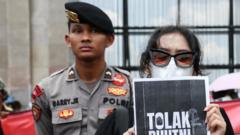Critics are alarmed as Indonesia's parliament approves revisions to military laws allowing active military personnel to hold civilian government positions, sparking protests and warnings of a return to Suharto-era dictatorship under President Prabowo Subianto.
Indonesia's Military Gains Increased Government Power Amid Protests

Indonesia's Military Gains Increased Government Power Amid Protests
Controversial law changes have sparked outrage in Indonesia as the military is given a larger role in governance, raising fears of a return to authoritarianism.
Indonesia's parliament has ignited widespread anger after passing controversial revisions to military law that grant the military a more significant role in government. Critics, including activists and human rights organizations, fear these changes could lead Indonesia back to the oppressive days of Suharto's regime, which lasted 32 years and ended in 1998 after widespread protests.
The amendments, endorsed by President Prabowo Subianto—a former special forces commander and son-in-law of Suharto—allow military officers to occupy government roles without resigning from their military positions. This decision has prompted hundreds of pro-democracy activists to camp outside the parliament building in Jakarta, protesting against what they perceive as a direct attack on Indonesia's democratic ideals.
"The essence of democracy is that the military should remain out of politics," said a concerned activist from the Indonesian Association of Families of the Disappeared. He added, "Since 1998, there has been a creeping murder of democracy," marking the new legislation as a sign that democracy is being eroded by the current House of Representatives.
The revisions permit active military personnel to fill roles in 14 civilian institutions, an increase from the previous limit of 10. Additionally, the retirement age for military officials in higher ranks has been extended, allowing four-star generals to serve until age 63, up from 60. The number of protesters has swelled to almost a thousand, brandishing banners reading, "Return the military to the barracks!" and "Against militarism and oligarchy."
While Indonesia has seen efforts over the past 25 years to curtail military involvement in politics, research indicates that nearly 2,600 active-duty officers were fulfilling civilian roles even before the latest legal revisions. Analysts express concern that this shift under President Prabowo marks a deeper consolidation of power, potentially jeopardizing civil liberties in favor of stability and state control.
As a prominent figure from Indonesia’s past, Prabowo leads with an agenda that reflects militaristic governance, reinforced by his administration's recent programs, such as a $4 billion initiative providing free meals to children and pregnant women, which enlists military support.
Defending the amendments, Defence Minister Sjafrie Sjamsoeddin argues that global military dynamics necessitate a reformed military capable of addressing both conventional and unconventional conflicts while ensuring national sovereignty is upheld. However, critics, including human rights advocates, warn that increasing military influence over government processes will compromise the impartiality and accountability expected from public institutions.
As protests continue across the nation, activist Sukma Ayu vows to resist these changes, stating, "There is only one word: Resist. We have no choice but to occupy the 'house of the people' until we claim victory." The situation remains tense as Indonesians grapple with the implications of these legislative changes on their hard-won democracy.























